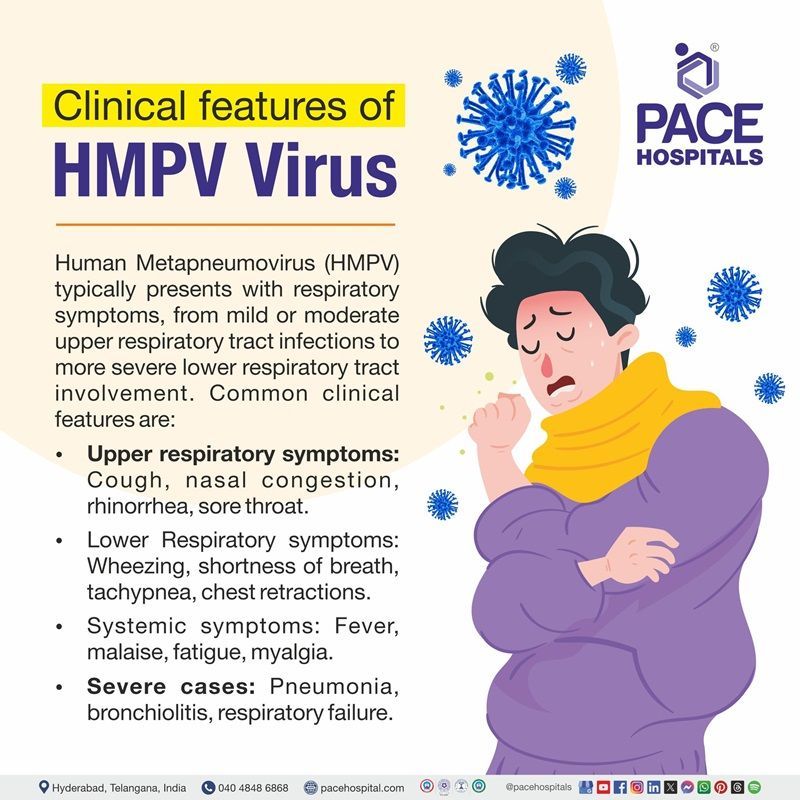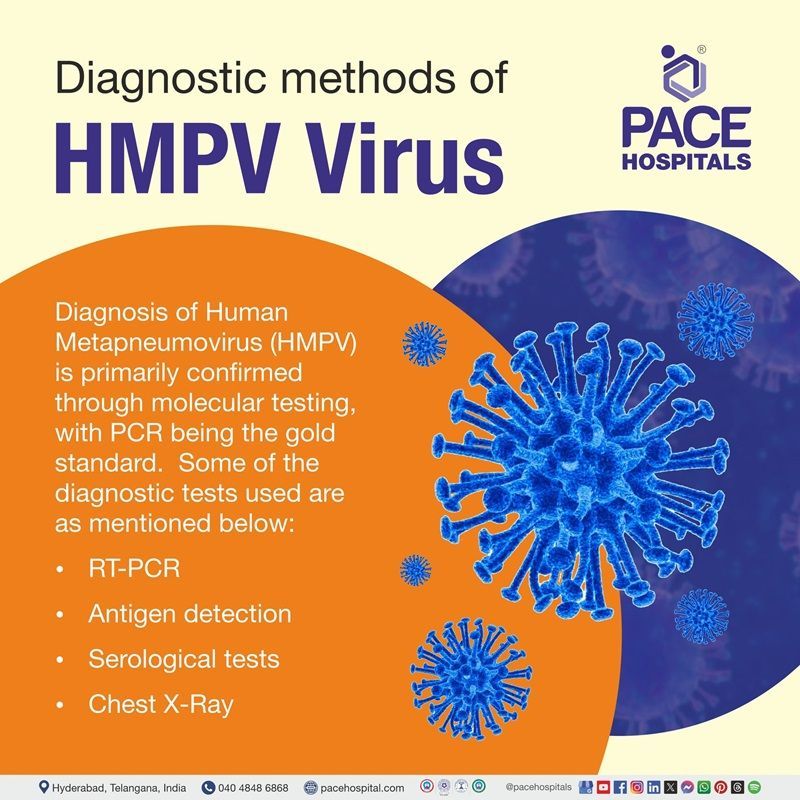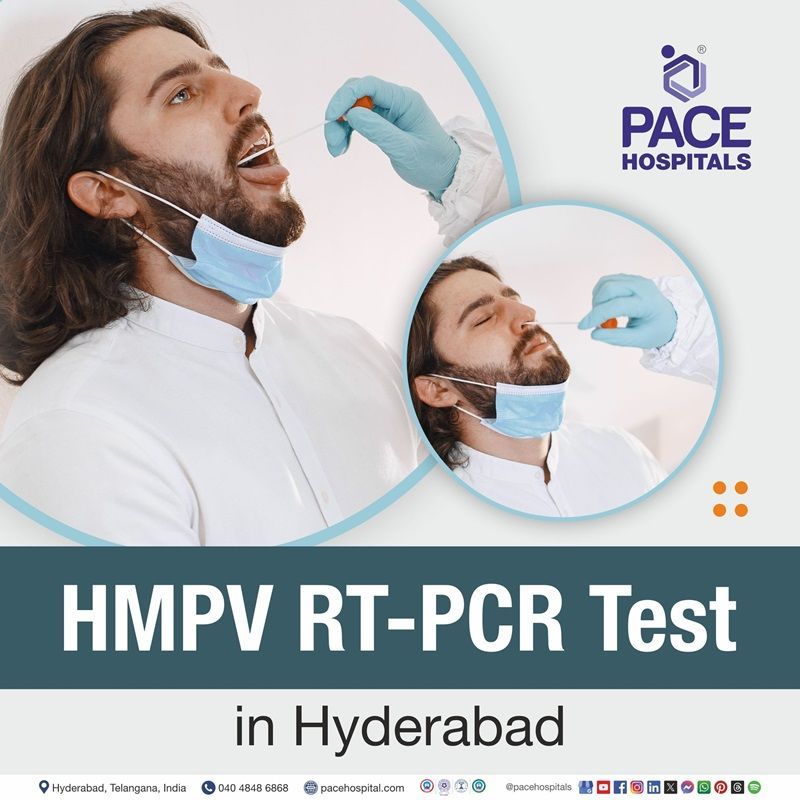HMPV RT-PCR test in Hyderabad, India
At PACE Hospitals, we are equipped with state-of-the-art RT-PCR testing lab accredited by National Accreditation Board for testing and Calibration Laboratories (NABL).
Request an appointment for HMPV RT-PCR test
HMPV RT-PCR test - appointment
How to book HMPV RT-PCR test online?
People living in Hyderabad can book HMPV RT-PCR test online at PACE Hospitals by following these steps:-
- For online booking, fill up the form - Request an appointment for HMPV RT-PCR test.
- Visit PACE Hospitals, HITEC City for sample collection at hospital. Locate Us
- Your HMPV RT-PCR test results will be available within 24 hours. You will receive a message via SMS or WhatsApp when the report is ready. Download the PDF report by following the link provided in the message.
- To know more, kindly call us at 04048486868
HMPV RT-PCR Routine Test
₹6,600
Test includes:
- Human Metapneumovirus (HMPV)
- Human Coronavirus
- Adenovirus
- Bocavirus
Report time: 24 Hrs
*sample collection at hospital
What is HMPV RT-PCR Test?
RT-PCR full form - Reverse Transcription Polymerase Chain Reaction
RT-PCR test is used to detect the presence of the genetic material of Human Metapneumovirus (HMPV). The sample is collected by inserting a swab inside the nose and from the back of the upper part of the throat.
RT-PCR test is equally effective in detecting virus in asymptomatic patients, but it has its own set of limitations, which include the inability to measure the severity of the virus and the inability to predict the future complications of the virus.
Human metapneumovirus (HMPV) Virus
Human metapneumovirus (HMPV) is one of the many respiratory viruses that can cause infections in people of all ages particularly during the winter and early spring months. The virus infection is usually a mild and self-limiting condition, and most cases recover on their own.
Diagnosis of HMPV
Human Metapneumovirus (HMPV) is a respiratory virus belonging to the Paramyxoviridae family. It causes respiratory infections that range from mild cold-like symptoms to more severe respiratory illnesses, particularly in young children, the elderly, and immunocompromised individuals.

Clinical features of HMPV
Human Metapneumovirus (HMPV) typically presents with respiratory symptoms, from mild or moderate upper respiratory tract infections to more severe lower respiratory tract involvement. Common clinical features include cough, fever, wheezing, shortness of breath, and in some cases, pneumonia or bronchiolitis.
- Upper respiratory symptoms: Cough, nasal congestion, rhinorrhea, sore throat.
- Lower Respiratory symptoms: Wheezing, shortness of breath, tachypnea, chest retractions.
- Systemic symptoms: Fever, malaise, fatigue, myalgia.
- Severe cases: Pneumonia, bronchiolitis, respiratory failure.
Diagnostic methods
Initially, the physician will do a detailed physical exam before collecting any swabs from mouth, throat or nose. Diagnosis of Human Metapneumovirus (HMPV) is primarily confirmed through molecular testing, with PCR being the gold standard. Other methods, such as antigen detection and serology, can also aid in diagnosis, though they are less commonly used.
PCR (Polymerase chain reaction)
This is the gold standard for diagnosis. A nasopharyngeal swab, throat swab, or sputum sample is used to detect HMPV RNA.
Standard PCR protocol
A typical polymerase chain reaction (PCR) setup consists of four steps:
- Adding required reagents and template to PCR tubes.
- Mixing and centrifugation.
- Amplifying per thermo cycler and primer parameters.
- Evaluating amplified DNA by agarose gel electrophoresis followed by ethidium bromide staining.
The RT-PCR test used for identifying Human Metapneumovirus (HMPV) consists of several steps aimed at amplifying and detecting viral RNA from a patient's sample.

Given below is a detailed step-by-step outline of the process:
1. Sample collection
- The process begins with sample collection, where respiratory samples such as nasopharyngeal or oropharyngeal swabs, nasal aspirates, or bronchoalveolar lavage (if clinically indicated) are obtained.
- These samples are placed in a viral transport medium (VTM) to preserve the RNA and transported to the laboratory promptly under cold conditions (2–8°C).
2. RNA extraction
- RNA extraction is a significant step in the RT-PCR test for detecting Human Metapneumovirus (HMPV), aimed at isolating viral RNA from the sample. The process begins with lysing the sample to release RNA using a lysis buffer.
- The RNA is then purified through methods such as silica-based spin columns, magnetic beads, or automated RNA extraction systems.
3. Reverse transcription
- The transformation of Viral RNA into complementary DNA (cDNA) is done by reverse transcription, which is necessary for amplification in the RT-PCR procedure. The reverse transcriptase enzyme, primers, and other required materials are combined with the isolated RNA in this stage.
- The mixture is then incubated for 15–30 minutes at a temperature of 42–50°C, allowing the synthesis of cDNA from the viral RNA template.
4. PCR amplification
- PCR amplification is conducted to amplify the HMPV-specific cDNA to detectable levels. The process begins by adding the cDNA to forward and reverse primers containing reaction mixture specific to the HMPV genome (targeting conserved regions like the N, L, or F gene), a probe for real-time detection (labelled with a fluorophore and quencher), DNA polymerase, dNTPs, and a reaction buffer.
- The amplification is carried out using a thermal cycler, by starting with an initial denaturation step at 95°C for 2–3 minutes. This is followed by 40–45 denaturation cycles for 15 seconds at 95°C and annealing at 55–60°C for 30–60 seconds, depending on the primers and probe used.
5. Detection and analysis
- Detection and analysis involve identifying the amplified products to confirm the presence of HMPV. This detection can be achieved through two main methods.
- In real-time RT-PCR, fluorescence emitted by the probe during each amplification cycle is measured, with Ct (cycle threshold) values used to determine the presence or absence of the virus. A lower Ct value indicates a higher viral load.
- On the other hand, because it relies on gel electrophoresis to visualize the amplified DNA fragments, classical PCR—which is relatively rare—requires extra steps and tools for interpretation.
6. Quality control
- To guarantee the precision and dependability of the RT-PCR test for HMPV, quality control is essential. It entails including internal, external, and positive controls into the testing procedure.
- A positive control, such as synthetic HMPV RNA or a known HMPV-positive sample, confirms that the assay can detect the virus.
- A negative control, such as RNase-free water or a non-template control, ensures there is no contamination or false-positive result.
- Additionally, an internal control, such as an endogenous gene like human RNase P, verifies the integrity of the sample and the efficiency of the RNA extraction and amplification processes.
7. Interpretation of results
- The interpretation of results in an RT-PCR test for HMPV is based on the Ct (cycle threshold) value and control validation.
- A positive result is indicated by a Ct value below the threshold, confirming the presence of the virus.
- A negative result is concluded when there is no amplification or when the Ct value exceeds the threshold, suggesting the absence of the virus.
- Results are considered inconclusive if controls are invalid or if Ct values are borderline, necessitating a repeat of the test to ensure accuracy.
8. Reporting
The results of the RT-PCR test for HMPV should be documented in a detailed laboratory report. The report must include the following information:
- The sample type (e.g., nasopharyngeal swab, nasal aspirate)
- The target gene (e.g., N, L, or F gene of HMPV)
- The Ct value (indicating the cycle threshold and viral load), and
- The test interpretation (whether the result is positive, negative, or inconclusive).
- This ensures that the findings are clearly communicated for clinical decision-making.
Precautions
- Ensure the use of RNase-free equipment and consumables to avoid RNA degradation.
- Adhere to biosafety protocols to prevent contamination and ensure a safe working environment.
- Confirm the accuracy and integrity of reagents and controls before initiating the test.
This RT-PCR workflow offers high sensitivity and specificity for detecting HMPV in clinical samples.
Other Major diagnostic procedures of HMPV virus are as given below:
- Antigen detection: Direct antigen detection methods like immunofluorescence (DFA) or enzyme immunoassays (EIA) can identify the virus, but these are less sensitive than PCR.
- Serology: Serological tests for HMPV-specific antibodies (IgM, IgG) can support the diagnosis, but they are not commonly used for acute diagnosis due to delayed antibody response.
- Imaging:
Chest X-ray may show signs of pneumonia, interstitial lung infiltrates, or other findings indicative of a viral respiratory infection.
Differential Diagnosis
Other respiratory pathogens, such as Influenza, Respiratory Syncytial Virus (RSV), Parainfluenza virus, Adenovirus, and SARS-CoV-2, need to be excluded, as they share overlapping clinical features.
Duration of RT- PCR for HMPV
RT-PCR is considered the most sensitive and specific method for detecting HMPV. It's performed in special laboratories and uses target-specific probes to detect amplified products. A real-time RT-PCR test for human metapneumovirus (HMPV) typically involves multiple cycles of thermal cycling, with the total time to complete the test taking up to 8 hours.
Frequently asked questions:
What are the symptoms of HMPV infection?
Symptoms of HMPV infection resemble those of other respiratory illnesses and may include fever, cough, wheezing, nasal congestion, sore throat, and difficulty breathing. In severe cases, HMPV can lead to bronchiolitis or pneumonia, especially in infants, elderly individuals, and those with weakened immune systems.
Is HMPV RT-PCR test painful?
HMPV RT-PCR tests typically involve minimal discomfort, but some individuals may experience mild side effects during the nasopharyngeal swab collection. These can include nose pain, tearing, coughing, sneezing, or gagging. The severity of these symptoms varies from person to person, depending on their individual pain tolerance.
What types of samples are used for HMPV RT-PCR testing?
Common samples used for HMPV RT-PCR testing include nasal swabs, throat swabs, sputum, or bronchoalveolar lavage fluid. The type of sample collected depends on the patient's symptoms and the severity of the respiratory illness. The sample should ideally be collected during the acute phase of infection.
How soon do results from HMPV RT-PCR come back?
Results from HMPV RT-PCR testing typically take between 24 to 48 hours, depending on the laboratory's workload and the complexity of the analysis. Some specialized labs may offer faster turnaround times. It's important to consult with the testing facility for expected result timelines.
Is RT-PCR for HMPV available worldwide?
RT-PCR testing for HMPV is available in many countries, particularly in hospitals and specialized diagnostic laboratories. However, availability may vary depending on the region, the capacity of healthcare systems, and the prevalence of HMPV infections in the area. Some countries may offer the test in more advanced centers.
What is the difference between RT-PCR and antigen tests for HMPV?
RT-PCR detects the genetic material of the virus, offering higher sensitivity and accuracy, especially in early-stage infections. In contrast, antigen tests detect proteins on the surface of the virus, which may not be as sensitive as RT-PCR. RT-PCR is considered the gold standard for diagnosing HMPV.
Can RT-PCR for HMPV be done during the flu season?
Yes, RT-PCR for HMPV can be performed during flu season, and it is particularly useful when differentiating HMPV infections from influenza or other respiratory infections with similar symptoms. Due to the overlapping symptoms, RT-PCR helps to identify the specific pathogen causing the illness.
How reliable is RT-PCR for detecting HMPV in children?
RT-PCR is highly reliable for detecting HMPV in children, even those with mild symptoms. Children, especially infants, are more susceptible to severe respiratory infections like bronchiolitis or pneumonia, so accurate and timely diagnosis via RT-PCR can guide appropriate treatment and management.
Can RT-PCR for HMPV detect viral variants?
Yes, RT-PCR for HMPV can detect different strains or variants of the virus if the test is designed to target specific viral genes. While RT-PCR identifies the presence of the virus, it may not always provide information about the specific strain unless additional sequencing is performed.
What is the role of RT-PCR in managing HMPV outbreaks?
RT-PCR plays a crucial role in the detection and management of HMPV outbreaks. Early identification of infected individuals using RT-PCR helps control the spread of the virus, allows for targeted treatments, and aids in implementing infection control measures in healthcare settings, particularly in pediatric and geriatric populations.
How does RT-PCR for HMPV compare to other respiratory virus tests?
Compared to other respiratory virus tests, such as rapid antigen or serological tests, RT-PCR is more sensitive and specific for detecting HMPV. It can detect viral RNA at lower levels, reducing the likelihood of false negatives. This makes RT-PCR the preferred method for diagnosing viral respiratory infections, including HMPV.
Can RT-PCR for HMPV detect co-infections?
Yes, RT-PCR can detect co-infections if multiple viruses or pathogens are present in the sample. In some cases, respiratory infections may be caused by a combination of viruses, such as HMPV and influenza or respiratory syncytial virus (RSV). PCR multiplex testing can detect multiple pathogens in a single test.
Do I need to fast before an RT-PCR test for HMPV?
No, there is no need to fast before an RT-PCR test for HMPV. The test primarily involves collecting a respiratory sample, and fasting does not affect the accuracy of the test. Patients should follow any specific instructions provided by the healthcare provider or laboratory conducting the test.
What factors can affect the accuracy of RT-PCR for HMPV?
Several factors can affect the accuracy of RT-PCR for HMPV, including the quality of the sample collected, the timing of sample collection (ideal during early infection), and the presence of inhibitors in the sample. Additionally, laboratory handling and processing errors can lead to false results, although these are rare.
Is RT-PCR testing for HMPV covered by insurance?
Coverage for RT-PCR testing for HMPV may vary depending on your health insurance plan, country, and specific policy guidelines. In many cases, the test may be covered if a healthcare provider deems it necessary for diagnosing a respiratory illness. It is recommended to check with the insurance provider before testing.
What happens if my RT-PCR test for HMPV is positive?
If your RT-PCR test for HMPV is positive, it confirms the presence of the virus in your respiratory sample. Your healthcare provider will assess the severity of your symptoms and decide on the appropriate treatment. In many cases, HMPV infections resolve with supportive care, but severe cases may require hospitalization.
Why choose PACE Hospitals?
- A Multi-Super Speciality Hospital.
- NABH, NABL, NBE & NABH - Nursing Excellence accreditation.
- State-of-the-art Liver and Kidney transplant centre.
- Empanelled with all TPA’s for smooth cashless benefits.
- Centralized HIMS (Hospital Information System).
- Computerized health records available via website.
- Minimum waiting time for Inpatient and Outpatient.
- Round-the-clock guidance from highly qualified super specialists doctors & para medical staff.
- Standardization of ethical medical care.
- 24X7 Outpatient & Inpatient Pharmacy Services.
- State-of-the-art operation theaters.
- Intensive Care Units (Surgical and Medical) with ISO-9001 accreditation.







